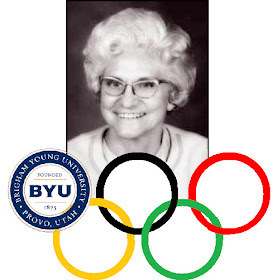Lgbt (lesbian, gay, bisexual, transgender) history for everyone. No academic gobbledigook. No deep analysis. Just queer facts. There's still a lot of bigotry around but there's also lots to celebrate.
Pages
▼
Sunday, 11 September 2016
Legacy of a Sporting Mormon
A lot is said about sporting legacy. Some talk about funding, some talk about more utilisation of venues. But I don’t think there’ll be many who speak about the legacy that lgbt Mormons have left.
It’s no secret that the Mormon Church and homosexuality are no companions, yet the Mormon church has produced several leading athletes and sports administrators. Brigham Young University (BYU), the central Mormon university in the US, has only recently been placed in the list of US universities on the “Shame List” by Campus Pride. Despite this BYU had a thriving lgbt network way back in the 1940s, one of the first such student networks. One of those lgbt students, Earl Kofoed, said there was more acceptance in the 1940s than there was by the end of the century.
Brigham Young University has produced many top Olympians and athletes. One figure who stands out in the field of female sport was a teacher at BYU called Dr. Leona Holbrook (1909-1980), pictured above.
Leona was one of the eldest children in a large Mormon family. In 1915 the family were sent as missionaries to New Zealand, which gave Leona her first taste of international culture. It was also where she first experienced school bullying because of her American accent and because she didn’t play sports, ironic in view of her future legacy in sport.
On the family’s return to Utah in 1918 9-year-old Leona experienced more bullying because of her acquired English accent and lack of knowledge of American sport. This pushed her into academic pursuits which led directly to her gaining early entrance into high school. At high school she was persuaded to take up field hockey. She took to it very well and in 1924 led the school to the Salt Lake City hockey championships. The influence of her physical education teacher led her to formulate her won methods of sports education in later years which are still felt at BYU today.
At the age of 16 Leona was accepted into the University of Utah. She majored in physical education, a remarkable decision for someone who, ten years earlier, had been bullied at school for not playing sports. She played a wide variety of sports at university and joined the Women’s Athletics Association, eventually becoming its President.
From university Leona taught physical education at high school level. There she began to practice what she experienced from her hockey teacher and developed a relationship with her students that made her much admired and loved. She encouraged all her students and had a genuine interest in their lives. This bonded the athletes together to give better performances.
In 1937 Leona took up a teaching position at BYU. It was there that student Earl Kofoed remembered her as a member of a highly visible group of lesbians. In 1959 she became the first Chair of the Department of Physical Education for Women. The respect she earned from BYU led to her successful appeals for improved facilities and increased number of female enrolment.
Throughout her time at BYU Leona became involved in both national and international sporting governing bodies including the US Olympic Committee of which she was the first woman to serve on the Board of Directors. From her position on this committee she travelled the world to conferences and congresses to encourage the principles of Olympism. On three occasions she participated in meetings of the International Olympic Academy, the last time being in 1979 at BYU itself when she lit the Olympic cauldron.
This was in the final year of her life. She had officially retired from BYU in 1974 though remained as a part-time tutor. She received many honours from around the world for her world in sports administration and education and the encouragement of the equal participation of women in sport. Following her heath in 1980 from cancer BYU founded an award in her honour, the Leona Holbrook Spirit of Sport award. This is given annually to a female athlete at the university who displays the spirit of sport as exemplified by Leona Holbrook herself.
Leona’s legacy in sport influenced many female athletes from BYU to compete at the Olympic Games, and there is some credibility to the claim that it was her influence, particularly during the Olympic Academy meeting at BYU, that was vital in build up to the awarding of the 2002 Winter Olympic Games to Salt Lake City.

No comments:
Post a Comment